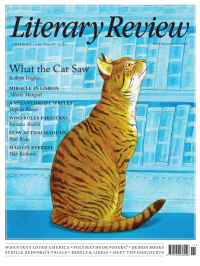Robert Colls
Let Them Read Catullus
A People’s History of Classics: Class and Greco-Roman Antiquity in Britain and Ireland 1689 to 1939
By Edith Hall & Henry Stead
Routledge 670pp £29.99
I was once informed by a guide at the oldest black church in Savannah, Georgia, that African slaves arrived there speaking ancient Greek. My surprise was not shared by other members of the party. Our guide clearly believed it. The elders of the church must have believed it or the guide wouldn’t have said it. And the rest were clearly happy to go along with it. This book makes no reference to the story of African slaves speaking ancient Greek, but it does smuggle outsiders into our traditional understanding of who comprehended the classics. For most of the period covered by this book, the vast majority of British people were not taught English, let alone Latin and Greek. When Tony Harrison, a ravenous scholarship boy, was taught ancient languages at Leeds Grammar School, his father, a baker (‘only our silence made us seem a pair’), wondered aloud why they were filling his son’s head with crap. Right into the 1970s, you had to have an O level in Latin if you wanted to read history at Oxford and then, a barbarian at the gate, you had to fight your way through Bede’s Historia ecclesiastica gentis Anglorum. I have two friends who still bear the scars.
And yet, for all that, Edith Hall and Henry Stead find hundreds of working-class men and some women who managed to learn the history and (less often) the languages of antiquity, not in order to pass an examination but in order to find joy and wisdom and even, in some

Sign Up to our newsletter
Receive free articles, highlights from the archive, news, details of prizes, and much more.@Lit_Review
Follow Literary Review on Twitter
Twitter Feed
Alfred, Lord Tennyson is practically a byword for old-fashioned Victorian grandeur, rarely pictured without a cravat and a serious beard.
Seamus Perry tries to picture him as a younger man.
Seamus Perry - Before the Beard
Seamus Perry: Before the Beard - The Boundless Deep: Young Tennyson, Science, and the Crisis of Belief by Richard Holmes
literaryreview.co.uk
Novelist Muriel Spark had a tongue that could produce both sugar and poison. It’s no surprise, then, that her letters make for a brilliant read.
@claire_harman considers some of the most entertaining.
Claire Harman - Fighting Words
Claire Harman: Fighting Words - The Letters of Muriel Spark, Volume 1: 1944-1963 by Dan Gunn
literaryreview.co.uk
Of all the articles I’ve published in recent years, this is *by far* my favourite.
✍️ On childhood, memory, and the sea - for @Lit_Review :
https://literaryreview.co.uk/flotsam-and-jetsam